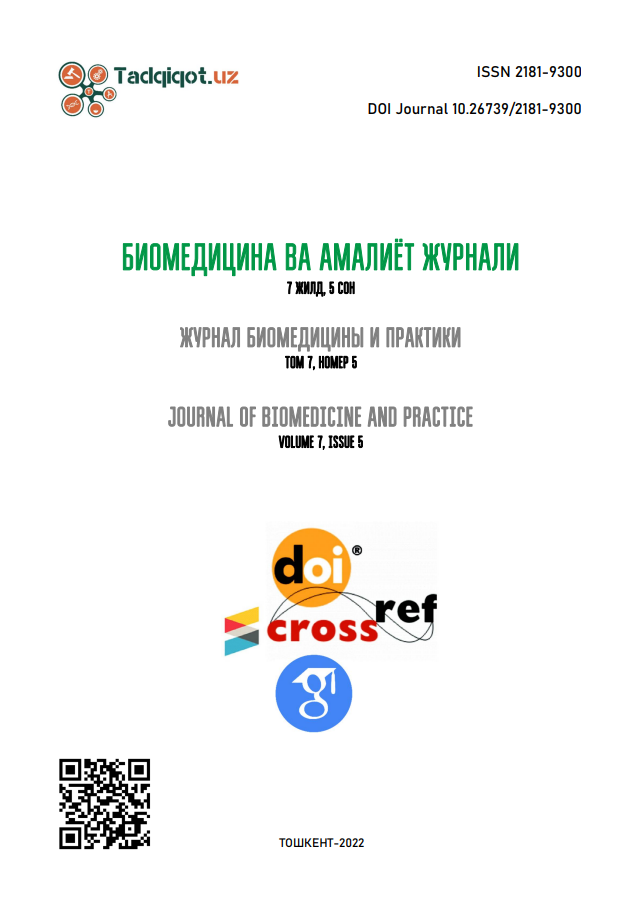THE ROLE OF THE MICROELEMENT ZINC IN THE PROCESS OF METABOLISM (LITERATURE REVIEW)
Keywords:
zinc; adipose tissue; adipogenesis; atherosclerosis; zinc-α2-glycoproteinAbstract
This review of the literature analyzes the available scientific studies on the role of zinc in the body, as well as the mechanisms of action and its significance in the pathogenesis of obesity. In experimental studies, it was found that the zinc content decreases in adipose tissue in obesity and affects the activity and differentiation of adipocyte cells. Considering zinc as one of the regulators of adipogenesis, a violation of its metabolism is observed along with dysfunction of adipose tissue. By correcting the exchange of zinc in adipose tissue, it is possible to achieve normalization of the exchange of the lipid spectrum. At the same time, since its excessive accumulation in adipocytes also leads to their dysfunction, it is important to conduct additional studies to study the mechanisms of action of zinc deficiency and excess in adipose tissue.
References
Andreini C.A. Bioinformatics view of zinc enzymes // J. Inorg. Biochem. -2012. -Vol. 111. -P. 150-156
Baltaci A.K., Mogulkoc R. Leptin and zinc relation: in regulation of food intake and immunity // Indian J. Endocrinol. Metab. -2012. –Vol.16(Suppl. 3). –P. 611-606. DOI: 10.4103/2230-8210.105579
Cruz K.J.C., Morais J.B.S., de Oliveira A.R.S. et al The effect of zinc supplementation on insulin resistance in obese subjects: a systematic review // Biol. Trace Elem. Res. -2017. –Vol.176(2). -P. 239-243. DOI: 10.1007/s12011-016-0835-8
Fernandez-Sanchez A., Madrigal-Santillan E., Bautista M. et al Inflammation, oxidative stress, and obesity // Int.J. Mol. Sci. -2011. –Vol. 12(5). -P. 3117-3132. DOI: 10.3390/ijms12053117
Fukunaka A., Fujitani Y. Role of zinc homeostasis in the pathogenesis of diabetes and obesity // Int. J. Mol. Sci. -2018. –Vol. 19(2). –P. 476. DOI:10.3390/ijms19020476
Gu K., Xiang W., Zhang Y. et al. The association between serum zinc level and overweight/obesity: a meta-analysis // Eur. J. Nutr. -2019. –Vol. 58(8). –P. 2971-2982. DOI: 10.1007/s00394-018-1876-x
Huang X., Jiang D., Zhu Y. et al Chronic high dose zinc supplementation induces visceral adipose tissue hypertrophy without altering body weight in mice // Nutrients. -2017. –Vol. 9(10). –P. 1138. DOI: 10.3390/nu9101138
Klöting N., Blüher M. Adipocyte dysfunction, inflammation and metabolic syndrome // Rev. Endocr. Metab. Dis. -2014. –Vol.15(4). –P. 277-287. DOI: 10.1007/s11154-014-9301-0
Liu M.J., Bao S., Bolin E.R. et al Zinc deficiency augments leptin production and exacerbates macrophage infiltration into adipose tissue in mice fed a high-fat diet // J. Nutr. -2013. –Vol.143(7). -P.1036-1045. DOI: 10.3945/jn.113.175158
Maret W. Regulation of Cellular Zinc Ions and Their Signaling Functions. In: Zinc Signaling // Singapore. Springer. -2019. –Vol. 5. –P. 22. DOI: 10.3390/ijms18112285
Olechnowicz J., Tinkov A., Skalny A., Suliburska J. Zinc status is associated with inflammation, oxidative stress, lipid, and glucose metabolism // J. Physiol. Sci. -2018. –Vol. 68(1). –P.19-31. DOI: 10.1007/s12576-017-0571-7
Pandurangan M., Veerappan M., Kim D.H. Cytotoxicity of zinc oxide nanoparticles on antioxidant enzyme activities and mRNA expression in the cocultured C2C12 and 3T3-L1 cells // Appl. Biochem. Biotechnol. -2015. –Vol. 175(3). –P.1270-1280. DOI: 10.1007/s12010-014-1351-y
Pathak A. Supplementation of zinc mitigates the altered uptake and turnover of 65Zn in liver and whole body of diabetic rats // Biometals. -2011. -Vol. 24. -P. 1027-1034
Pelletier C.C., Koppe L., Croze M.L. et al White adipose tissue overproduces the lipid-mobilizing factor zinc α2-glycoprotein in chronic kidney disease // Kidney Int. -2013. –Vol. 83(5). –P.878-886. DOI: 10.1038/ki.2013.9
Prasad A.S. Impact of the discovery of human zinc deficiency on health // J. Trace Elem. Med. Biol. -2014. -Vol.28. № 4. -P.357-363
Severo J.S., Morais J., Beserra J.B. et al. Effect of Zinc Supplementation on Lipid Profile in Obese People: A Systematic Review // Curr. Nutr. Food Sci. -2019. –Vol. 15(6). –P. 551-556. DOI: 10.2 174/1573401314666180420094522
Severo J.S., Morais J.B.S., Beserra J.B. Role of zinc in zinc-α2-glycoprotein metabolism in obesity: a review of literature // Biol. Trace Elem. Res. -2020. –Vol. 193(1). –P.81-88. DOI: 10.1007/s12011-019-01702-w
Sharif R. The role of zinc in genomic stability // Mutat Res. -2012. -Vol. 733. -P. 111-121
Smith U., Kahn B.B. Adipose tissue regulates insulin sensitivity: role of adipogenesis, de novo lipogenesis and novel lipids // J. Int. Med. -2016. –Vol. 280(5). –P. 465-475. DOI: 10.1111/joim.12540
Tinkov A.A., Popova E.V., Gatiatulina E.R. et al Decreased adipose tissue zinc content is associated with metabolic parameters in high fat fed Wistar rats // Acta Sci. Pol. Technol. Aliment. -2016. –Vol.15(1). –P. 99-105. DOI: 10.17306/J.AFS.2016.1.10
Zahid H., Miah L., Lau A.M. et al Zinc-induced oligomerization of zinc α2 glycoprotein reveals multiple fatty acid-binding sites // Biochem. J. -2016. –Vol.473(1). –P. 43-54. DOI: 10.1042/BJ20150836
Тиньков А.А. Механизмы адипотропного действия цинка и их роль в патогенезе ожирения // Патогенез. -2020. -№18(2). –С.20-26. DOI: 10.25557/2310-0435.2020.02.20-26
Шейбак В.М. Транспортная функция сывороточного альбумина: цинк и жирные кислоты // Вестник Витебского государственного медицинского университета. -2015. - Т.14. -№ 2. -С.17 – 23

